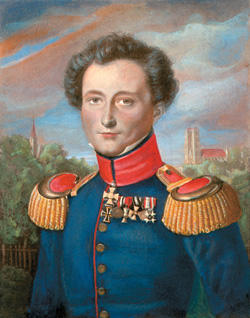 Although the ancient Chinese military philosopher Sun Tzu is fashionable these days, the preeminent thinker on war is undoubtedly the Prussian general Carl von Clausewitz. A veteran of the Napoleonic Wars, Clausewitz closely studied the conflicts and wrote a profound and enduring treatise titled On War (1831), most famous for its definition of war as “the continuation of politics by other means.”
Although the ancient Chinese military philosopher Sun Tzu is fashionable these days, the preeminent thinker on war is undoubtedly the Prussian general Carl von Clausewitz. A veteran of the Napoleonic Wars, Clausewitz closely studied the conflicts and wrote a profound and enduring treatise titled On War (1831), most famous for its definition of war as “the continuation of politics by other means.”
The Internet abounds with material and commentary regarding Clausewitz and his masterpiece. The place to start is The Clausewitz Homepage (www.clausewitz.com), edited by Christopher Bassford, a professor of strategy at the Naval War College. It’s a treasure—practically everything one could want to know about Clausewitz and his work, including bibliographies, analyses, texts, and even a few videos, such as a segment from the film Crimson Tide in which two U.S. naval officers debate the relevance of Clausewitz in the nuclear age.
A not-to-be-missed Bassford gem is a dated but still useful edition of On War, translated by British colonel James J. Graham in 1873. The introductory chapter is mandatory for anyone interested in military affairs. And well worth reading is Ohio State University professor Alan D. Beyerchen’s essay “Clausewitz, Nonlinearity and the Unpredictability of War,” a widely influential analysis from 1992 that brilliantly links Clausewitzian thought with today’s complexity theory.
An excellent introduction to Clausewitz is a 33-minute video lecture by James Helis, viewable on YouTube (search for “Clausewitz and James Helis”). Formerly head of the national security and strategy department at the U.S. Army War College and now the superintendent of the U.S. Merchant Marine Academy, Helis expertly provides a concise biography of Clausewitz, the context of his times, and a précis of his ideas.
Finally, for a whimsical yet impressive On War primer, see The Children’s Illustrated Clausewitz (clausewitzforkids.wordpress.com), a work by Caitlin Fitz Gerald, a foreign policy writer. Clausewitz is portrayed as a rabbit garbed as a Prussian general—and a master of expressing his thought simply but not simplistically.
Mark Grimsley, professor of history at Ohio State University, blogs at Blog Them Out of the Stone Age at warhistorian.org/wordpress.





